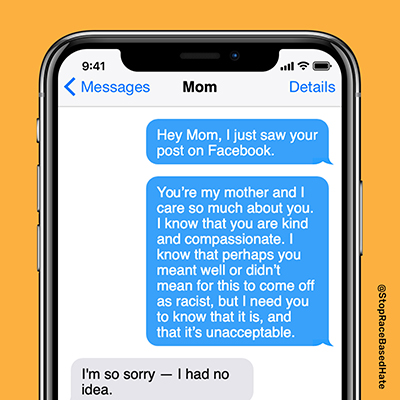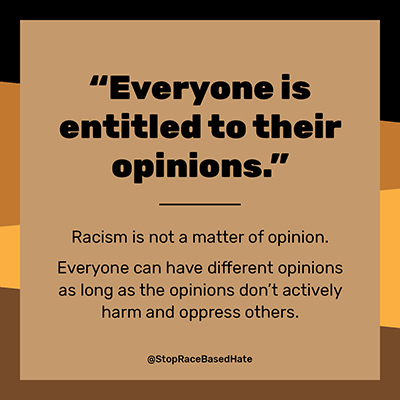A guide to identifying and calling out racism in all its forms
“Where are you from?”
“Everyone is entitled to their own opinions.”
“I just don’t see colour.”
At first glance, statements like the above may seem innocent enough. But a new online initiative aims to draw awareness to the racist assumptions that underpin them – and give people a readymade way to push back.
Stop Race Based Hate is a collaboration between Linda Hoang (Radio and Television ’11), Carmen Cheng and Jessie Cayabo, three friends and women of colour who for several years noticed an alarming spike in anti-Asian hate crimes across North America.
“Personally, I’ve been trying to use my online platform to call out racism and raise awareness of anti-racism education,” says Hoang, a blogger and social-media strategist in Edmonton.
But it wasn’t until March 2021, when eight people were killed at a series of spas in Atlanta – six of them Asian women – that the trio felt compelled to take a more public stand. Hoang, Cheng and Cayabo published an online statement denouncing anti-Asian racism and hate in their home province, using the hashtag #StopAsianHateAlberta.
Because all three women do work connected to the food industry, they also reached out to culinary professionals across Alberta, more than 60 of which signed onto the statement in solidarity.
The response they received was overwhelmingly positive. In fact, many people told Hoang that the anti-racist language she and her friends used could be useful in calling out racism in their own networks, too.
“A lot of the feedback was that this was articulated really well – and it felt like that articulation was what was missing for a lot of people,” Hoang says. “That’s how the idea for the tool came to be.”
Unpacking assumptions and biases
 Stop Race Based Hate encourages readers to confront racism in their communities by giving them the words to do so quickly and effectively.
Stop Race Based Hate encourages readers to confront racism in their communities by giving them the words to do so quickly and effectively.
Launched in February 2022, it presents a range of common statements based on the experiences and observations of the three women, from the blatantly racist (“Go back where you came from”) to the more subtly problematic (“We just need to be kinder to each other”), and then suggests productive ways of responding that address the deeper assumptions and biases at work.
When a racist act makes national news, for example, one common sentiment is, “This isn’t us.” However, as the entry on the Stop Race Based Hate website points out, “Canada is not as nice or innocent as we have been told. Change will not occur unless we change this narrative and acknowledge the very real, racist and oppressive systems that exist in this country.”
The entry then quotes the non-profit group Black Physicians of Canada and an article from Maclean’s magazine, and then links to four other news stories that explain Canada’s race problem in more detail.
"We wanted to highlight everyday phrases that people don’t realize are perpetuating racism, and make it easy for people to call them out.”
The website, designed by local agency Kick Point, which donated its time and expertise to the volunteer effort, also includes a critical response template to help readers formulate their own responses to scenarios and phrases not covered in the database.
“A lot of the feedback we’ve had so far is ‘That’s racist?’” Hoang says with a laugh. “That was intentional. We wanted to highlight these everyday phrases that people don’t realize are perpetuating racism, and make it as easy as possible for people to call them out.”
Making the tool easy to use is key, agrees Madlen Christianson, NAIT’s manager of diversity and inclusion. “People are starting to become more aware of racism, but they’re not necessarily feeling equipped to step in when they experience it or see it,” she says.
“Initiatives like this provide people with resources to respond.”
A resource for other groups
 In the coming months, Hoang hopes to expand the website’s database of racist statements, and is looking for reader feedback for suggestions on new entries.
In the coming months, Hoang hopes to expand the website’s database of racist statements, and is looking for reader feedback for suggestions on new entries.
She’s also consulted with local advocacy organizations, including the John Humphrey Centre for Peace and Human Rights and Bent Arrow Traditional Healing Society, about having Stop Race Based Hate added to their list of anti-racism resources.
The tool has additional value, Christianson believes, because of the way it combines expert analysis with lived experience.
“Talking about their personal experience, and what might have worked for them, can be a very powerful tool,” she says. “When you’re talking about racism, what often happens is that people will question whether or not it’s real. When you have people who are willing to share their story, that can help build empathy.”
Hoang knows that racism is a complex and deeply entrenched problem, and jokes that one tool probably isn’t going to solve it all on its own. But she also knows that every step to fight back is worthwhile, and is hopeful that Stop Race Based Hate will help empower people to get involved and speak up.
“The more people who are comfortable clearly articulating and calling out racism is one of our biggest measures of success,” she says.